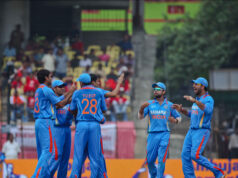After all the anticipation and controversy over the pitch, there were fears that the much-anticipated India-Pakistan game in New York would turn into a low-scoring farce. Instead, it turned out to be a low-scoring thriller, with India emerging victorious and Rohit Sharma standing out with his captaincy. While Jasprit Bumrah was India’s hero with his game-changing bowling, the India skipper was an unsung hero. The only thing the captain needed to get right was the coin toss, reports Live Cricket Score.
It is rare for an Indian team to go into a game against arch-rivals with only three specialist batters – Virat Kohli, Suryakumar Yadav, and Rohit himself – with the rest being wicketkeepers, all-rounders, or specialist bowlers. The same squad played against Ireland, but Pakistan is no Ireland. More batting power might have been needed on a treacherous wicket against a relentlessly fiery bowling attack. But the captain had the courage of his conviction.
More than his batting decisions, Rohit’s strategic bowling choices led India to victory against Pakistan, who had bowled India out for the first time in a T20 match. Babar Azam’s side appeared to dominate for 35 of the 40 overs, but Rohit was a calming influence on the ground. He ensured the team remained composed, making calculated bowling changes under pressure. Defending a total of just 119 is rare, and this achievement marked the lowest total ever defended in T20Is by India.
With the sun emerging from behind the clouds as Pakistan started their chase, the odds were heavily stacked against India. Lateral movement, a benefit Shaheen Afridi & Co. enjoyed earlier in the morning under cloudy and gloomy weather, disappeared when Indian bowlers came on. However, through deft field placements and timely bowling changes, the Indian captain ensured that a target of 120 felt much bigger than it was.
“I would have said 140 would have been a good score on that pitch. India didn’t get that, so I thought we had the game. We knew it would be tight, but sometimes it’s fun seeing games like that. It’s not always about sixes and hitting, getting 230s and 240s. You can have an entertaining game on a 120 chase. So, I don’t think it’s bad for the game,” Pakistan coach Gary Kirsten said.
He did not say as much, but Rohit ensured the target was not 120 but 140. At one stage, Pakistan, unable to rotate strike, was forced to go for boundaries, which became their undoing. It was a total display of self-assurance by India against a team of pusillanimity.
Evidently, the pacers would play a crucial role on the pitch, but Rohit managed to extract the best out of his spinners. Axar Patel bowled eight deliveries to the two dangerous left-handers in the Pakistan line-up, Fakhar Zaman and Imad Wasim, conceding just nine runs, including four dot balls. Combined, Jadeja and Axar finished with an economy rate of about five runs in their four overs and a wicket.
Rohit’s strategic move to bring back Bumrah for his third over is already hailed as brilliantly timed. However, recalling Axar for his second over, the fourth over of spin, in the 16th proved to be as much a masterstroke. Axar conceded only two runs in an over when the Pakistan batters were expected to attack him. Imad Wasim attempted to cut him three times but failed to connect on each occasion. At that critical juncture, with Pakistan needing 37 runs off 30 balls with six wickets in hand, Axar’s over could have shifted the momentum. Axar’s precision bowling, complemented by a well-set field, thwarted Pakistan’s attempt to accelerate. India survived that pivotal, forcing the Pakistani batters to take risks against challenging bowlers. A wicket fell in the very next over.
Bumrah’s third over undoubtedly marked the turning point in the match. Waqar Younis, constantly emphasising on air, suggested that the final two Bumrah overs would determine the game’s outcome, and his fears came true. Bumrah’s return proved decisive as he struck with the very first ball. Mohammad Rizwan, who had been anchoring the innings for Pakistan, was dismissed with a delivery that was an absolute peach. This was a stroke of genius by the captain; Bumrah conceded only three runs in the over.
If that wasn’t impressive enough, Bumrah’s performance in the 19th over was exemplary. Despite the temptation to continue with his main bowler after the Rizwan breakthrough, Rohit wisely kept him for the more crucial 19th. With Pakistan requiring 21 runs in two overs, Bumrah conceded just three runs and claimed a wicket. It was pure gold dust. Arshdeep Singh was left with the luxury of defending 18 runs in the final over. Barring an unlikely scenario of pressure getting to the bowler, only one winner was possible at that stage. Arshdeep did not falter.
Rohit’s reading of the wicket proved sagacious. While there was good bounce off the pitch, the pace slowed once the ball was pitched. He adapted his bowling changes accordingly. Additionally, his alterations in the batting order were spot-on. Departing from the conventional tactic of persisting with a left-right batting combination, he promoted Axar up the order instead. The decision paid off as Axar steadied the innings, partnering with fellow left-hander Rishabh Pant to add 39 runs for the third wicket after the early loss of the openers (19 for two).
Rohit is undoubtedly fortunate to have such quality players like Pant and Hardik Pandya in his team. While Pant showcased his typically adventurous style with a score of 42, Pandya made a significant contribution with the ball. His figures of two for 24 in his allotted four overs proved invaluable. The bowling unit stepped up when it mattered most, but Bumrah’s performance was exceptional. Finishing with figures of three for 14 in four overs, he deservedly earned his second consecutive Man of the Match award in the tournament. Remarkably, he also clinched the same award the last time these teams met, albeit in a different format, in Ahmedabad in October 2023.
“We wanted to add more runs, and obviously, we left one over (India were all out in 19 overs for 119). So, once we started, the message was clear in the huddle: now that is over, now what is next? What are the things that are in our control? So, we will try to focus on that and not create panic. Yes, there will be boundaries here and there. People might play good shots, but we’ll have to try to be composed and hold our shape,” Bumrah said of what Rohit told the players during the innings break.
Bumrah & Co. are lucky to have a captain who can extract the best from them. In Twenty20 cricket, the importance of captaincy cannot be overstated, and Rohit proved this on Sunday against a difficult opponent in the most challenging conditions.



























